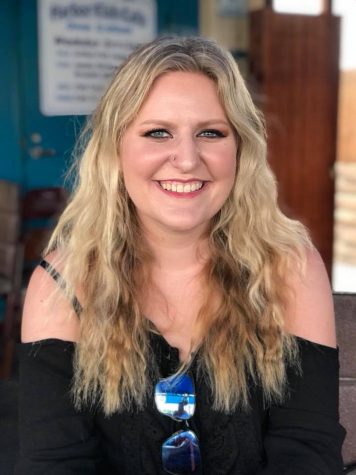It was the first show of the Magnificent Coloring World Tour and I sat in my seat at the Cal Coast Credit Union Open Air Theater on Thursday, Sept. 15, waiting for Chance the Rapper to perform as my friend turned to me and said, “It’s been really cool watching Chance grow up.”
The comment instantly took me back to high school, listening to “10 Day” and “Acid Rap” on my iPod Classic during class despite my teachers’ rules, the kind of rebellion young Chance would’ve certainly supported.
I remembered telling my friends about this rapper they should check out, and subsequently blasting “Favorite Song” on the drive home from football games.
The theme of growing up is what fueled the stage design and Chance’s youthful energy as he started the night by running on the stage yelling, “I got my city doing front flips!” sending the crowd into a frenzied sing-along of “Angels.”
The characters and props used in the show formed a plot through the songs in Chance’s set.
The stage was adorned with animatronic puppets resembling unconventional stuffed animals, perhaps Chance’s childhood imaginary friends.
Throughout the show Chance bantered with a life-size anthropomorphic lion with a familiar voice.
The recurring lion constantly reminded Chance to “not forget the message” and to “play the old stuff.” Chance complied by performing “Brain Cells,” “Cocoa Butter Kisses, and “Smoke Again,” but eventually opted for material from his latest album “Coloring Book.”
“I think they like the new stuff,” Chance said to the lion after an enthusiastic performance of “Mixtape.”
The lion accused Chance of “forgetting the message” and essentially turning into the big shot star Chance always promised he wouldn’t become.
“I don’t need no friends, I don’t need no label,” Chance replied, “and I certainly don’t need no problems.”
“You don’t want zero problems, big fella!” the lion shouted the trademark phrase from “No Problem” over the crowd’s cheers in response, and I finally realized where I knew his voice from.
Chance calmed down the energy for a moving performance of “Same Drugs,” a duet with another life-size anthropomorphic stuffed animal.
This visual confirmed my theory that the stuffed animals represented Chance’s childhood imaginary friends, as the lyrics of “Same Drugs” describe growing apart from a childhood friend.
“Don’t you miss the days?” Chance sang to the old friend. “Don’t you miss the danger?”
Chance also performed a string of the religious inspired songs on “Coloring Book,” proving to the lion that he hadn’t forgotten ‘the message’.
He stood before the crowd in chants of “Are you ready for your blessings?” as if conducting the world’s largest gospel choir.
Walking offstage after the religious section of the set, Chance encored with “Summer Friends,” leaving us with the taste of nostalgia so signature of his music.
By the end of the show, Chance had played “Coloring Book” in its entirety, along with a number of songs from “Acid Rap” and even his guest verses on Action Bronson’s “Baby Blue” and Kanye West’s “Ultralight Beam.”
His inclusions of fan favorites and his most well-known features in his set went along with the theme of the night; Chance hadn’t forgotten where he came from.
I looked around at the sold-out crowd and my friend’s remark rang true to me as I realized how strangely proud I was of Chance for how far he’s come.
His sense of camaraderie with his fan base especially plays into the recurring themes of nostalgia in his music. From “10 Day’s” “Prom Night,” to “Acid Rap’s” “Cocoa Butter Kisses,” to “Coloring Book’s” “Same Drugs,” Chance is always looking back at his past in a different light depending on his stage in life.
Just as he says in “Same Drugs,” I thought Chance would never grow up, and the youthfulness of his set did not prove to me his immortality.
Instead, it showed me that he would never shake the ‘one of us’ attitude that helps him resonate with my generation.
His refusal to sign with a label, the references to cartoons and video games that riddle his music, and his visible idolization in the artists he grew up listening to all contribute to fans looking to Chance as a friend, someone they can relate to.
My biggest takeaway of the night was that in watching Chance grow up, I realized I had too. I was no longer the high school kid tuning my teachers out with Chance’s music blasting through my headphones, I was watching him in a sold-out crowd on my college campus, validating the personal connection with his music my high school self felt. In evolving his music, Chance still turns to adolescence to humble and inspire him, looking to our shared generation with such a fondness that I can’t help but reminisce along with him.
Chance the Rapper couldn’t be a kid forever, but his world will always be colored with tints of youth.











